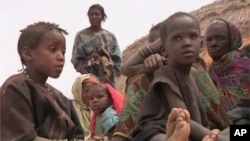United Nations aid agencies say speedy action can save the lives of more than one million children in West Africa’s Sahel region who are at risk of dying from acute severe malnutrition.
But, in an exclusive interview, the head of the U.N. Children’s Fund (UNICEF) tells VOA this window of opportunity is closing and the time for the international community to respond to this crisis is now.
The Sahel is facing its third food crisis in less than a decade. The United Nations estimates 15 million people are affected by food shortages and warns this number could go up to 23 million if the region, which stretches from the Atlantic Ocean to Chad and Cameroon, continues to be neglected.
Children are among the most vulnerable. The United Nations warns more than one million children in eight Sahelian countries are threatened with death from malnutrition-related causes.
The Exeutive-Director of the U.N. Children’s Fund, Anthony Lake, has just returned from a visit to Chad where he witnessed the impact of this nutrition crisis upon the children. He tells VOA the statistics are impressive, but adds they often mask the heartbreaking reality of the children behind them.
He recalls a visit to one of UNICEF’s feeding centers where children suffering from acute severe malnutrition are being treated. “There I met a mother and a little child named Fatima," said Lake. "She looked to be about five months old or four months old. She is actually just over a year. But, she is recovering. And, I just kept looking at her and thinking not just about how she is alive, but she now has this whole future ahead of her. And, when you see that in one child and then you think about it in terms of a million times, you can be very moved," he said.
UNICEF, with the Ministry of Health in Chad, has set up 261 nutrition rehabilitation centers and it has plans to double the number in the next two months. The agency also has set up hundreds of nutrition centers across the other seven drought-affected countries.
While these treatment centers are critical in saving lives, U.N. agencies agree they are only one element in a much larger, complex emergency operation. But, this life-saving operation is hampered by lack of money. The United Nations has received less than half of the $740 million it needs.
Lake recognizes so-called donor fatigue may be playing a part. “That may be. But, these are children. These are children’s futures. These are children who are not responsible for all of the problems that are now possibly going to end their lives. So, we simply cannot afford to get tired," he said.
The Director-General of the World Health Organization (WHO), Margaret Chan, agrees. She notes the problem of malnutrition is compounded by disease. She says most children suffering from malnutrition who are not vaccinated against measles, meningitis and other diseases will not survive.
However, she says 95 percent will live if action is taken now to immunize these children and prevent and treat malnutrition. “We have an early warning. And, we still have time to act before it turns into a major crisis or mega-crisis as in the case of Pakistan and Haiti…And, we are talking about one to 1.5 million children under five whose life is hanging in the balance," she said.
U.N. officials say it costs a lot less to immunize children and prevent disease, then to treat them when they become ill. They say it costs a lot less to feed children before they become malnourished than to treat them once they are on the brink of death. They say there is still time to prevent the worst from happening-but, time is running out.








